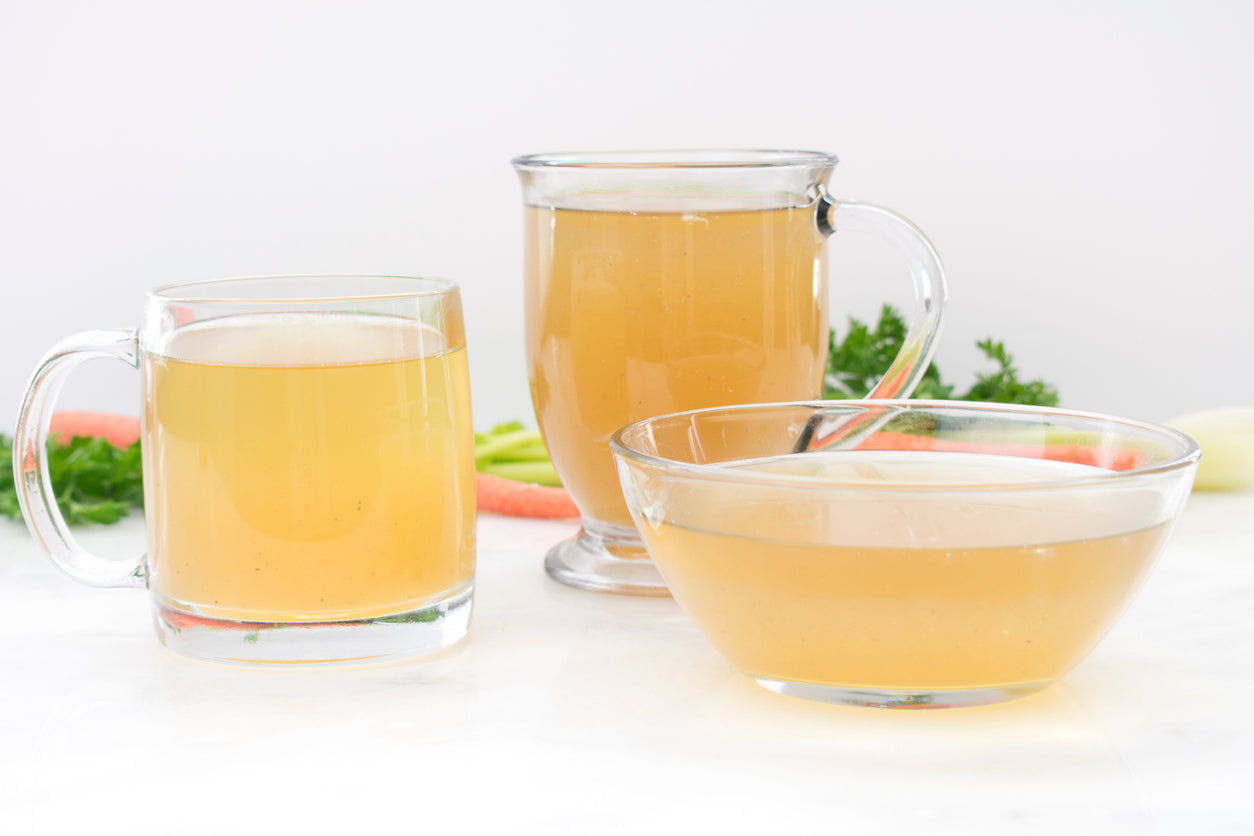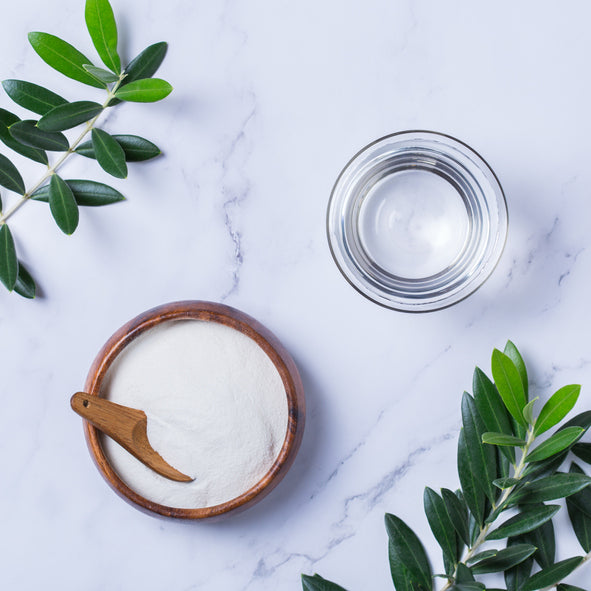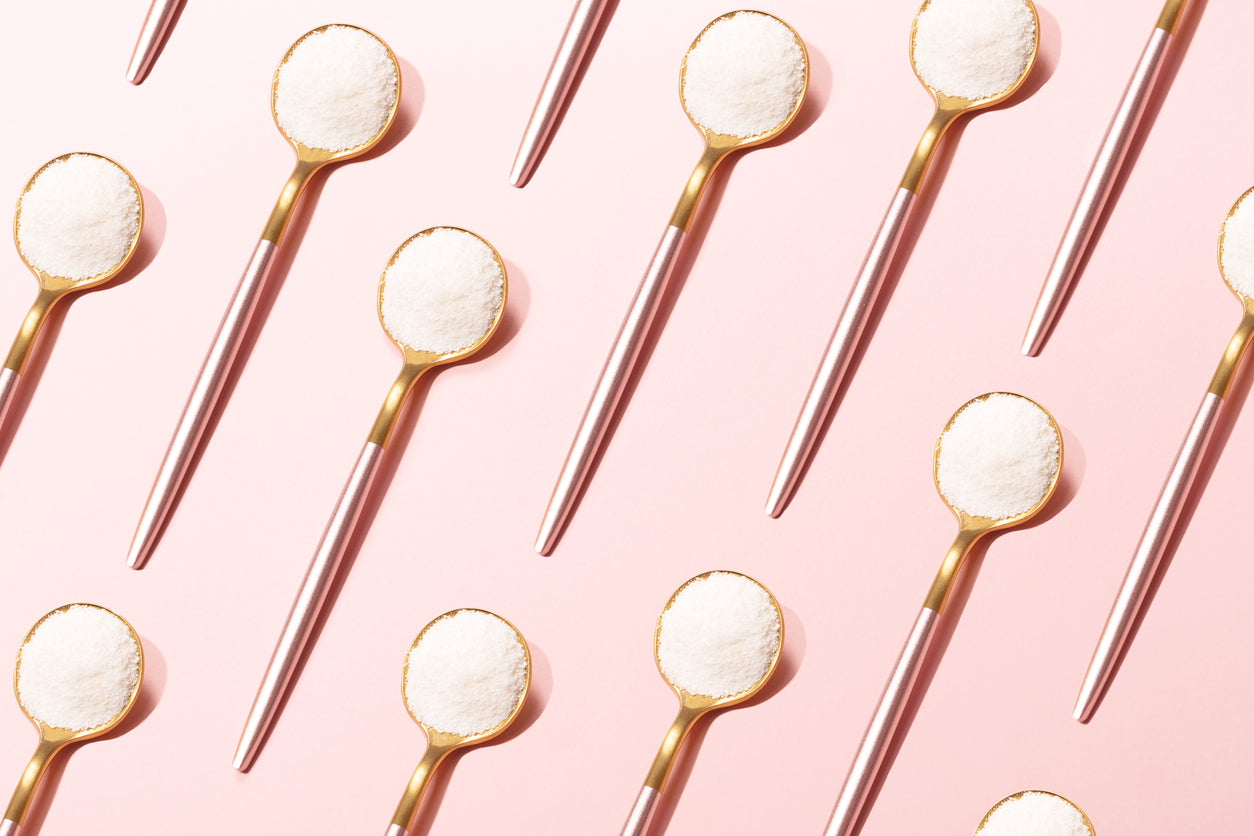
What is Collagen?
Collagen is often a hot topic of discussion when it comes to fine lines, wrinkles, and anti-aging methods. But how much do you really know about all the extraordinary powers collagen has to offer? Learning the ins and outs of collagen will bring you incredible health and wellness benefits. Imagine a healthy gut, an increase in energy, and relief from muscle aches and joint pains. And how do you reap these rewards? Let’s dive into all you need to know about collagen, including:
- The science behind collagen
- Collagen vs. Gelatin
- Hydrolyzed collagen and collagen supplements
- What you should know about collagen peptides
- Collagen deficiency
- How you can support collagen production naturally
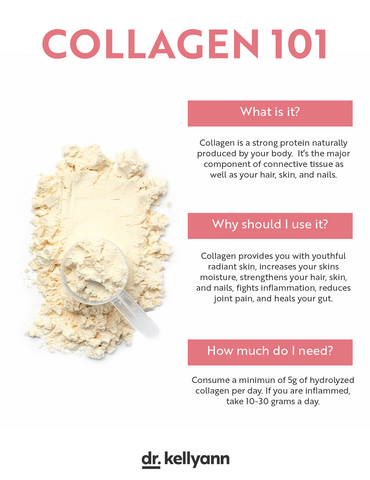
Where Does Collagen Come From?
Your body naturally produces collagen and is responsible for your skin’s elasticity. It’s the firmness in your skin that creates that “bounce-back” effect we all want to hang on to. You can thank collagen for your skin's resilience as it prevents those fine lines and wrinkles you see in the mirror. Collagen is the most abundant protein in your body, but unfortunately, natural production begins to slow with age. I like to think of it as the “glue” that works to hold your body together. Without it, your blood vessels, skin, and tendons become fragile.
The Types of Collagen
According to Yale University, collagen is the family of proteins that are the primary structural component of the body’s connective tissues, making up a third of all protein in your body. The four primary types of collagen are:
- Type I: This type accounts for roughly 90% of your body's collagen and is made of densely packed fibers. It provides structure to your bones, tendons, fibrous cartilage, connective tissue, skin, and teeth.
- Type II: More loosely packed fibers make up type II, which you will find in elastic cartilage to cushion your joints.
- Type III: This type of collagen will support the structure of your organs, muscles, and arteries.
- Type IV: Found in layers of your skin, type IV helps with filtration.
Supporting Collagen Production
There are several ways to support collagen production naturally. Here are some of my favorite go-to tips and tricks if you prefer to step up your diet rather than add in collagen supplements:
Glycine and Proline
Glycine and proline are vital to your health and can provide an array of benefits.
Glycine provides support throughout your body, including:
- Protecting your stomach lining from developing ulcers
- Aiding the detox process to cleanse and revitalize your cells
- Protecting your body from shock in cases of sepsis, hemorrhages, and endotoxins
- Reducing damage to your liver or kidneys due to drugs and toxins
- Improving overall blood flow to your liver, kidney, heart, intestine, and skeletal muscle
Proline supports your body by synthesizing proteins and metabolizing your food. Supporting your body’s collagen production includes providing nourishing foods.
Some of the best sources of glycine include:
- Asparagus
- Banana
- Bone Broth
- Legumes
- Cabbage
- Cauliflower
- CucumberDried Seaweed
- Kale
- Kiwi
- Lean Beef
- Lamb
- Poultry Skin
- Pumpkin
- Spinach
- Watercress
Excellent sources of proline include:
- Bone Broth
- Grass-fed Beef
- Pastured Chicken
- Cage Free Egg Yolks
- Alfalfa sprouts
- Asparagus
- Beans
- Cabbage
- Cucumber
- Chives
- Watercress
- White mustard seeds
Vitamin C
Another collagen-boosting nutrient is vitamin C. Without an adequate supply of vitamin C, your body will be unable to produce new collagen. You can load up on glycine and proline all you want, but without vitamin C, your body just can’t cut it. Unlike conditional amino acids, your body does not have the luxury of producing its own vitamin C. So, start loading up on vitamin C-rich foods, friends:
- Strawberry
- Brussels sprouts
- Orange
- Kiwi
- Grapefruit
- Red bell pepper
- Broccoli
- Papaya
- Kale
- Pineapple
Lysine
Lysine is another vital collagen-boosting nutrient. This amino acid is a must for collagen synthesis. Here are a list of foods to concentrate on:
-
Grass-fed Beef
- Pastured chicken
- Black Beans
- Kidney Beans
- Lentils
- Lima beans
- Pears
- Pistachios
- Potatoes
- Pumpkin seeds
- Tempeh
- Quinoa
Garlic
My absolute favorite collagen-boosting choice is garlic. It’s a powerful little herb, containing lipoic acid and taurine. Both of these help repair damaged collagen. Garlic is also a great source of sulfur, a powerhouse in collagen synthesis. Yes, please!
Antioxidants
And you don’t want to forget the need for antioxidants to boost your collagen production. They are necessities in protecting against free radical damage. Just remember to eat a rainbow of fruits and veggies - red beets and peppers, delicious orange carrots and sweet potatoes, dark leafy greens, and tons of purple berries.
These colorful choices offer a variety of enzymes, vitamins, and minerals that your body needs and craves to look and feel its best.
Copper
I bet you didn’t know that copper can activate an enzyme critical in producing collagen. You can find it in shellfish and red meat, but don’t overdo it.
Collagen and Sulfur
Sulfur plays a crucial role in your body’s collagen production. Add broccoli, eggs, onions, and cauliflower to your diet. Bok Choy, cabbage, and leeks are also high in sulfur and delicious choices.
White Tea
Studies show drinking white tea prevents the breakdown of collagen. Now, who doesn't love the sound of that? It protects the skin’s protein and elastin while preventing signs of premature aging. Are you rushing to brew a cup yet?
Gelatin Bone Broth for Collagen
I’m sure you knew this one was coming, right? I mean, gelatin-rich bone broth is my go-to for everything that needs healing and replenishing. Collagen production is no exception! So, let’s break down the collagen and gelatin confusion. Collagen comes from those tough to eat portions of animals, such as the bones and ligaments. When you prepare bone broth, you’ll end up with nutrient-rich gelatin. Gelatin forms from cooking the collagen out of the bones and breaking it down to form easily digestible gelatin. This jiggly gelatin houses all the yummy goodness your body needs to heal.
Gelatin vs. Hydrolyzed Collagen
Gelatin and hydrolyzed collagen do have similarities, but differences worth noting. Both hydrolyzed collagen and gelatin are made from animal collagen and share the same amino acid profile. But their properties and structure are different.
Hydrolyzed collagen can break down into much smaller units of protein. This process is helpful, as it makes it more easily digestible. It is also able to dissolve in cold and hot water. On the other hand, gelatin is unable to. Gelatin even "gels" while hydrolyzed collagen will not.
High-quality powder gelatin can be a great source, as it comes from healthy animals and provides essential collagen-building amino acids. Gelatin powder has some fantastic culinary benefits too. In fact, my Bone Broth Diet includes several delicious and nutritious gelatin recipes that will fill you up while restoring your health and wellness.
Many people tend to prefer hydrolyzed collagen over using powder gelatin because of its ability to dissolve quickly in liquids. It just makes for a great grab and go option. It has no taste or smell so you can whip it up in any liquid, any time of day. Whether you prefer gelatin or hydrolyzed collagen, your body will love you for flooding it with the essential nutrients it craves.
Getting Your Daily Collagen
There are several ways to get in an abundance of gelatin and collagen each day. The options are endless, from incorporating collagen supplements to adding your favorite collagen-boosting veggies into a pot of gelatin-rich bone broth. Also, you can try a mixture of Vitamin E and Coenzyme Q10, or whip up tasty collagen supplements if you’re on the go. My Orange Collagen Cooler and Chocolate Almond Collagen Shake are unbelievably delicious.
Collagen supplements deliver nutrients straight to the areas of your body that need healing and repair. Collagen supplements are also hydrolyzed, broken down into smaller molecular structures, and transport easily throughout your bloodstream. Collagen supplements are a reliable way to begin restoring your health.
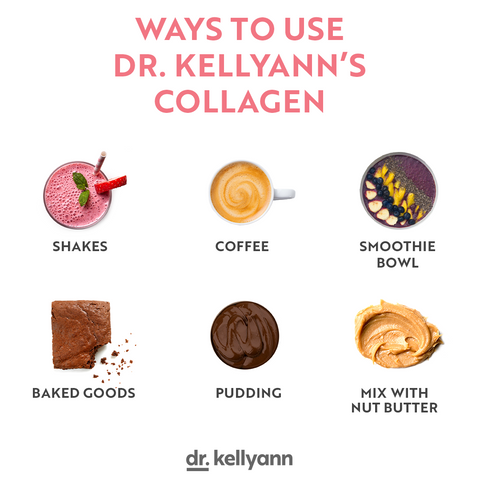
Collagen Dosage
So, how much should you be consuming? I recommend a minimum of five grams of hydrolyzed collagen per day to increase glycine levels and proline circulation throughout your bloodstream. However, if you already have inflammation, as most of us do, more collagen supplements may be necessary. I recommend a minimum range of ten to fifteen grams daily, and up to thirty grams daily if necessary. Don’t worry, sipping on warm cups of gelatin-rich broth or choosing from a wide array of delicious collagen supplements will meet these needs.
When Should I Take Collagen?
While there may be some debate over the perfect time to take your collagen supplements, trust me, you can sip on a delicious cup of bone broth all day and night without consequence. There’s no worry of making you drowsy or keeping you up late. In fact, adding collagen supplements will help alleviate sleep concerns! It’s wonderfully soothing as a warm broth before bedtime too. Add in your favorite collagen supplements to a cup of morning coffee or healthy after-dinner dessert. The time of day is entirely up to you.
Can I Take Too Many Collagen Supplements?
My simple answer to you is: no. There are no reports of issues linked to the consumption of too much collagen. A little extra won’t hurt you, so let’s squash that myth altogether. It's different from many supplements because our body already produces collagen on its own, so adding collagen supplements throughout your day is safe. The worst you may experience from adding more collagen supplements than usual is an upset stomach. Collagen supplements are one of the safest supplements to consume.
Collagen Deficiency
There are sure signs to keep an eye out for that may alert you of a possible collagen deficiency:
- Premature signs of aging in your face, skin, nails, teeth, and bones
- The appearance of fine lines and wrinkles or sagging skin
- Sore or painful joints, muscles, and bones
- Leaky gut symptoms
- Wounds no longer heal quickly
Reasons for Collagen Deficiency
You may suffer from a lack of antioxidants, which protect collagen from additional damage. If you lack collagen, you become more susceptible to skin damage by free radicals, and your skin becomes more sensitive to:
- Pollution
- Smoke
- Excess sun
A collagen deficiency may also stem from a medical condition preventing your body from absorbing specific vitamins and nutrients. It's a severe issue that could cause collagen destruction, and nobody wants that. Introducing collagen supplements is a safe, easy, and healthy way to prevent many health concerns, so load up.
What are Collagen Peptides?
You may hear the terms collagen peptides and hydrolyzed collagen in use interchangeably. You may even notice the term hydrolyzed collagen peptides from time to time. So what’s the difference between hydrolyzed collagen and collagen peptides? Hydrolyzed collagen is generally another way to describe collagen peptides. Your body is not able to effectively absorb and utilize collagen in its original state. Collagen peptides make this a possibility. Collagen undergoes a process known as hydrolysis, the breakdown of collagen peptides into smaller chains of amino acids. During this process, larger collagen molecules react with water to begin the breakdown. These smaller units become what we call collagen peptides. Collagen peptides are vital since they make collagen more bioavailable, increasing absorption into your bloodstream when you digest it. As the collagen peptides get to work repairing various areas of your body, your cells will build up your collagen to their full-length size and continue to make repairs and provide the necessary energy. Now, who doesn’t love the sound of that?
Which amino acids build collagen peptides?- Glycine
- Proline
- Hydroxyproline
Due to their small size, collagen peptides quickly dissolve in both hot and cold water. Not to mention collagen peptides are practically odorless and tasteless, making them desirable features when it comes to powder supplements.
Additional Collagen Forms
Collagen Beauty Creams
I know all about the hype with collagen skin care creams. Trust me when I say your time and money are better off when you invest in natural daily collagen supplements instead. Think of the expensive cream on your bathroom counter as a band-aid, a temporary fix to a more significant issue. On the surface, it may seem to solve the problem, but those creams won’t get to the root of your premature aging skin issues. Sure, you’re applying moisture, but you aren’t boosting your collagen production by rubbing it on top of your skin. And if you’re putting all your efforts into those pricey collagen creams, let me tell you, you’re missing out on a world of incredible benefits collagen supplements and gelatin bone broth provides your body.
Collagen Supplement Edibles
My chocolate collagen fiber bars make the perfect snack or breakfast bar. If you’re short on time, toss one in your purse or stash them in your desk drawer for easy access. Or mix up your selection with various shakes, smoothies, and yes, even coffee and creamer! I make it as simple as I can for you to enjoy switching to a healthier lifestyle!
The Bottom Line of Collagen
While it’s a lot to absorb, knowing the ins and outs of collagen can bring a tremendous amount of health and happiness to your body. If you're ready to jumpstart your health, wellness, and anti-aging goals, let me help you plan a successful course of action today!
Keep thinking Big and living BOLD!







